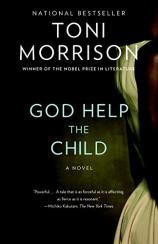God Help the Child
Review
God Help the Child
Toni Morrison's GOD HELP THE CHILD is a searing commentary on how parents treat children and the effects of childhood trauma that may never go away. The story begins with the birth of a little girl who is "so black she scared [her mother]. Midnight black, Sudanese black. I'm light skinned, with good hair, what we call high yellow, and so is Lula Ann's father." The child is immediately rejected by her mother, who can't bear to touch her.
As Lula Ann tries to get attention, she tells a terrible lie about a teacher at her school. She accuses the woman of touching kids, which leads to a 10-year prison sentence. When Lula Ann gets older, she leaves town and becomes an entrepreneur for a makeup company. One of her colleagues guides her into a style of wearing white most of the time, and she looks stunning. She changes her name to Bride and meets a man with whom she falls in love: Booker. He, too, carries a burden on his soul: his brother was molested and murdered, and he can't seem to move on with his life.
"Fans and newcomers alike will be forced to think about newspaper headlines screaming about abused children in a new light. The horror that these girls and boys suffer will feel more real after reading this masterpiece of a novel."
At the center of the book is Bride's dysfunctional relationship with her mother. She will do anything, even misbehave, just so that her mother will have to hit her so she can feel the older woman's hand. But this doesn't work because Sweetness finds other ways to punish Lula Ann, like locking her in a closet. These traumatic events do not deter Lula Ann from constantly seeking some kind of kinship with her mother. “What you do to children matters,” Morrison writes. “And they might never forget.”
When Bride goes to make some kind of peace with the woman whose life she stole, the old lady beats her up and throws her out of her motel room. Booker is furious with Bride for going to see her, and he abruptly leaves. She falls to pieces, using drugs, alcohol and sex to try to forget. Now out in California, she is involved in a car wreck and a kindly "hippie" couple takes her in. Nobody knows where she is. She stays with these people, as does a little girl they found in an alley in the rain; thus they name her Rain. Rain is a "lost child" because she ran away from her drunken mother, who was renting her out to men for money.She and Bride become very close.
Morrison shines a much-needed spotlight on the most vulnerable and helpless population in the world. She shifts her story from perspective to perspective but ultimately comes back to the core of the story: child abuse and neglect. Sweetness justifies her own abuse of Bride as a way of teaching her how to survive in the world. But the damage she inflicts stays with the child forever.
According to Morrison, “Each will cling to a sad little story of hurt and sorrow --- some long-ago trouble and pain life dumped on their pure and innocent selves. And each one will rewrite that story forever, knowing the plot, guessing the theme, inventing its meaning and dismissing its origin. What waste. She knew from personal experience how hard loving was, how selfish and how easily sundered. Withholding sex or relying on it, ignoring children or devouring them, rerouting true feelings or locking them out. Youth being the excuse for that fortune-cookie love --- until it wasn’t, until it became pure adult stupidity.”
GOD HELP THE CHILD is a homage to some of Morrison's very early work, like THE BLUEST EYE and SULA. There, too, little girls are treated like trash, much like Bride and Rain. The raw feelings in her latest effort will move any reader with its "propulsive energy" and realistic pain. Fans and newcomers alike will be forced to think about newspaper headlines screaming about abused children in a new light. The horror that these girls and boys suffer will feel more real after reading this masterpiece of a novel.
Reviewed by Barbara Lipkien Gershenbaum on April 23, 2015
God Help the Child
- Publication Date: January 26, 2016
- Genres: Fiction
- Paperback: 192 pages
- Publisher: Vintage
- ISBN-10: 0307740927
- ISBN-13: 9780307740922





